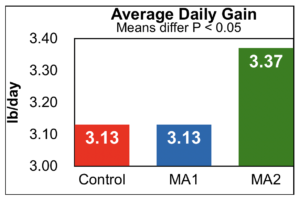
Benefits of Micro-Aid® in High-Stress, Feedlot Receiving Cattle
105 recently-weaned Angus x Hereford calves (75 steers and 30 heifers) were obtained from an auction yard and road-transported 500 miles over a 12-hour time period to the feedlot. Shrunk body weight (BW ≈ 485 lb) was recorded and calves were ranked by sex, source, and shrunk BW, and allocated to pens (7 pens/treatment), which were assigned to 1 of 3 treatments: 1) Control (no Micro-Aid® supplementation), 2) 1 g/calf daily of Micro-Aid® Feed Grade Concentrate (MA1), or 3) 2 g/calf daily of Micro-Aid® Feed Grade Concentrate (MA2). Micro-Aid® was mixed with soybean meal and top-dressed daily into the morning TMR feeding. Calf performance and morbidity was monitored through the 60 day study.
As shown in the figure below, supplementing Micro-Aid® at 2 g/calf daily increased (P < 0.05) feedlot receiving average daily gain by 8% due to a 4% enhancement (P < 0.05) in feed efficiency compared with non-supplemented cattle.

Although Micro-Aid® supplementation did not prevent the incidence of BRD in these high-risk cattle, both feeding levels reduced (P < 0.05) the need for antimicrobial treatments to heal calves diagnosed with BRD symptoms (1.05, 1.10 and vs. 1.40 treatments for MA1, MA2 and Control, respectively). Specifically, 30 to 35% fewer sick cattle fed either 1 or 2 g/calf daily of Micro-Aid® required a second antimicrobial treatment.
- Micro-Aid® supplementation increased calf daily gain when included at 2 g/calf daily and is primarily attributed to increased feed efficiency. Prior research has consistently demonstrated an effect of Micro-Aid® on increased microbial nitrogen yield and a more ideal and effective source of amino acids for absorption in the lower gastrointestinal tract. Accordingly, this enhanced rumen fermentation and diet utilization is further supported by the benefits in cattle performance in the present study.
- Incidence of BRD was similar among treatments, and hence did not contribute to treatment differences reported for performance. In turn, calves supplemented with Micro-Aid® at either 1 or 2 g/calf daily and diagnosed with BRD symptoms required less antimicrobial treatments to recover from sickness compared with non-supplemented cohorts. The direct cost of antimicrobial treatment during the experiment was estimated to be $30 per antimicrobial treatment, which represents a savings of $9.00 to 10.50 per Micro-Aid® treatment in reduced antimicrobial use.

